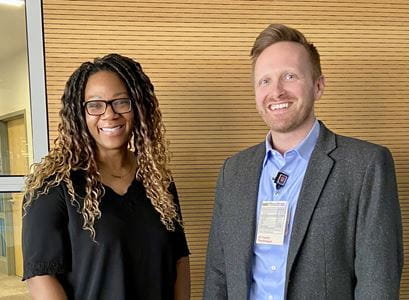INDIANAPOLIS – Indiana University School of Medicine researchers recently were awarded $4.7 million from the Patient-Centered Outcomes Research Institute (PCORI) to further the study of caregiver intervention in reducing adolescent alcohol use and other substance use disorders (SUDs).
PCORI is an independent, nonprofit organization authorized by the U.S. Congress with a mission to fund patient-centered comparative clinical effectiveness research that provides patients, their caregivers and clinicians with the evidence-based information they need to make better informed health and healthcare decisions.
The funding will support a new research project to compare the effectiveness of brief interventions in the primary care setting to reduce alcohol and other substance use in adolescents. This five-year project, commencing in March 2024, is being led by co-principal investigators Zachary Adams, PhD, and Tamika Zapolski, PhD, MS, both associate professors of psychiatry at the IU School of Medicine.
“Alcohol is the most-used substance among adolescents and can lead to several negative outcomes if it isn’t identified and addressed early,” Adams said. “This funding will allow us to find the most effective and efficient treatment plan to get adolescents the help they need before it becomes a larger issue.”
More than 90% of U.S. adolescents receive care in primary care clinics, and primary care providers are among the most familiar and accessible health care professionals in both local and national communities.
IU Health and Riley Children’s Health, in partnership with the State of Indiana, are currently supporting the Pediatric Integrated Behavioral Health Initiative, led by IU School of Medicine’s Leslie Hulvershorn, MD, and Matthew Aalsma, PhD, MA, and managed by Practice Administrator Cara Jones. The initiative aims to add more behavioral health support into IU Health primary care settings, which will increase access to high-quality behavioral health care to Indiana pediatric patients. These practices will serve as the study sites for the PCORI study.
The project will study the efficacy of brief interventions with varying types of caregiver involvement and support. All enrolled adolescents will be offered “Teen Intervene,” a brief intervention that includes motivational interviewing, education, personalized feedback, goal setting, and skills for avoiding alcohol and other substance use problems. Teen Intervene can be recommended to adolescents from a standardized substance use screener completed in the primary care setting.
Zapolski said caregiver involvement is key to a successful intervention process.
“Parents and other types of caregivers can play a vital role in supporting their adolescents, but the logistics of involvement can be challenging,” she said.
To address this potential hurdle, the study will compare three approaches to caregiver involvement: no caregiver involvement, a dedicated caregiver session, and a self-paced online parenting program called “Family Check-Up Online.”
The research team aims to enroll 585 adolescents aged 12-17 from diverse sociodemographic backgrounds across 18 or more primary care clinics in rural, urban, and suburban communities in Indiana. The participants will be asked to complete online surveys and brief interviews at multiple timepoints to provide valuable insights into the effectiveness of interventions over time on outcomes including alcohol and other substance use frequency and amount, mental health, service utilization, and overall wellbeing.
To ensure the project's relevance and success, the research team will collaborate closely with a patient and provider advisory board comprising community stakeholders, youth, caregivers, and primary care clinicians. A stakeholder advisory panel of national and state-level leaders in adolescent healthcare will also provide guidance from start to finish.
“Findings from this study can be disseminated and implemented quickly in other primary care settings, helping to reduce adolescent alcohol and other substance use problems nationally,” Zapolski said.
“This study was selected for PCORI funding for its potential to answer the need for real-world evidence to enable optimal use of brief interventions to reduce and prevent alcohol use among adolescents,” said PCORI Executive Director Nakela L. Cook, MD, MPH. “We look forward to following the study’s progress and working with IU School of Medicine to share the results.”
The IU School of Medicine's commitment to the wellbeing of youth takes a significant stride forward with this innovative and comprehensive approach to addressing adolescent substance use disorders.
“These interventions could help redefine the way pediatricians and other primary care providers prevent adolescent alcohol and other substance use in Indiana and across the country,” Adams said.
Other IU investigators involved in the project include IU School of Medicine’s Brigid Marriott, PhD, and Wei Wu, PhD, and the IU School of Public Health-Bloomington’s Jon Agley, PhD, MPH.
About IU School of Medicine
The IU School of Medicine is the largest medical school in the U.S. and is annually ranked among the top medical schools in the nation by U.S. News & World Report. The school offers high-quality medical education, access to leading medical research and rich campus life in nine Indiana cities, including rural and urban locations consistently recognized for livability. According to the Blue Ridge Institute for Medical Research, the IU School of Medicine ranks No. 13 in 2023 National Institutes of Health funding among all public medical schools in the country.




